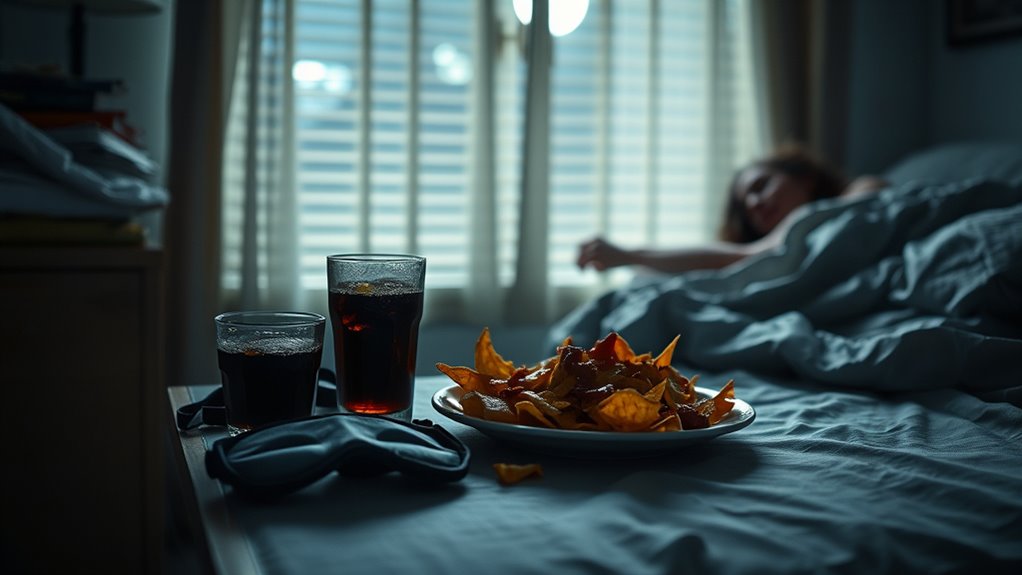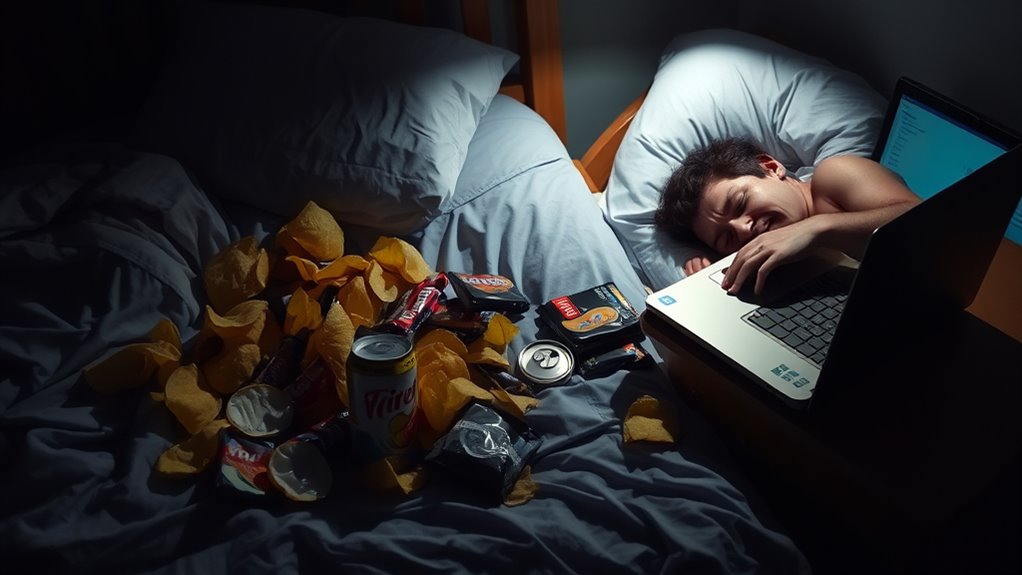Eating late-night snacks, especially heavy, fatty, or spicy foods, can trigger vivid nightmares because they interfere with your sleep quality and brain activity. These foods disrupt digestion and cause your brain to cycle through lighter sleep stages more often, increasing dream recall and intensity. Poor sleep hygiene also plays a role in promoting unsettling dreams. If you want to understand more about how your habits impact your dreams, keep going to discover the science behind food-induced dreams.
Key Takeaways
- Late-night snacks, especially heavy or spicy foods, can disrupt sleep and increase vivid, unsettling dreams.
- Digestion during sleep causes lighter sleep stages, heightening dream recall and intensity.
- Certain foods stimulate brain activity, influencing dream content and possibly triggering nightmares.
- Poor sleep hygiene combined with late eating can lead to fragmented sleep and more frequent nightmares.
- Adjusting diet and bedtime routines can reduce food-induced nightmares and promote more restful sleep.

If you often find yourself waking up from disturbing nightmares after late-night snacking, you’re not alone. Many people notice that what they eat before bed can influence their dreams, sometimes leading to vivid, unsettling nightmares. This connection isn’t random; it’s rooted in how food impacts your brain and sleep patterns. To understand why, it helps to explore the role of dream analysis and sleep hygiene.
Dream analysis reveals that nightmares often reflect unresolved stress, anxieties, or subconscious fears. But food can also act as a trigger, especially when eaten close to bedtime. When you indulge in heavy, fatty, or spicy foods late at night, your digestive system works overtime, which can interfere with your sleep quality. This disturbance may cause your brain to enter lighter sleep stages more frequently, increasing the chances of vivid or frightening dreams. The disruption of sleep hygiene—your overall habits that promote restful sleep—can make nightmares more likely. Poor sleep hygiene includes irregular sleep schedules, excessive screen time before bed, and consuming stimulating foods or drinks late at night. These habits hinder your ability to enter deep, restorative sleep, making your dreams more intense and easier to remember, often with negative content.
Understanding this link can help you modify your habits to reduce nightmares. For example, practicing good sleep hygiene by establishing a consistent bedtime routine and avoiding late-night snacks high in sugar, caffeine, or spice can make a significant difference. When your digestion is less active during sleep, your brain can focus on repairing and consolidating memories rather than processing discomfort or digestion-related disruptions. Additionally, engaging in dream analysis might help you recognize patterns or triggers linked to your nightmares, allowing you to address underlying stressors or anxieties. Keeping a dream journal can give you insight into recurring themes and help you identify whether certain foods or habits correlate with your nightmares. Recognizing that sleep disruptions can be linked to dietary choices underscores the importance of managing both diet and sleep habits for better dream experiences.
Ultimately, managing what you eat late at night and improving your sleep hygiene can reduce the frequency and intensity of nightmares. It’s about creating a sleep environment that promotes calm and stability, allowing your brain to rest properly. When your sleep is undisturbed and your dreams are less vivid or frightening, you’ll wake up feeling more refreshed and less anxious about bedtime. Remember, small adjustments—like choosing lighter snacks or establishing a calming pre-sleep routine—can have a profound impact. Pay attention to how your body responds, and over time, you’ll likely notice a decrease in those disturbing midnight dreams.
Frequently Asked Questions
Can Certain Foods Trigger Nightmares More Than Others?
Certain foods can indeed trigger nightmares more than others. Spicy or heavy meals might cause digestive disruption, making it harder to sleep peacefully. Foods linked to food poisoning can disturb your rest and increase vivid dreams or nightmares. You also might experience discomfort or acid reflux, which can disrupt sleep cycles. So, being mindful of what you eat before bed helps reduce the chances of food-induced nightmares.
Do Sleep Positions Influence Food-Induced Nightmares?
Your sleep posture can influence dream comfort and potentially affect food-induced nightmares. Lying on your stomach or side may increase pressure on your stomach, leading to discomfort or indigestion that disrupts sleep, possibly triggering nightmares. Maintaining a relaxed sleep posture with proper support can promote better dream comfort. Experiment with different positions to see which helps you sleep more peacefully, especially after late-night snacks, and reduce the chances of unsettling dreams.
Are There Specific Nutrients That Prevent Disturbing Dreams?
Certain nutrients can promote dream consistency and reduce disturbing dreams. You might consider magnesium or vitamin B6, which have been linked to better sleep quality and vivid, but less distressing, dreams. Timing your nutrient intake—like having magnesium-rich foods in the evening—can help improve sleep and minimize food-induced nightmares. By focusing on nutrient timing, you can support healthier sleep cycles and enjoy more peaceful, consistent dreams.
How Long After Eating Should I Avoid Midnight Snacks?
If you want to dodge nightmares, you should avoid eating midnight snacks at least 2-3 hours before bed. This gives your digestive process enough time to wind down and prevents your stomach from turning into a wild rollercoaster during sleep. Eating too late can disturb your sleep cycle, making you more prone to vivid dreams and nightmares. So, plan your meal timing wisely to enjoy peaceful, dreamless sleep.
Do Age or Gender Affect Susceptibility to Food-Induced Nightmares?
You might notice that age and gender influence how food affects your dreams. Geriatric dreams often change, and older adults could experience more vivid or unusual dreams due to hormonal shifts. Gender differences also play a role; women and men may react differently to certain foods, impacting their susceptibility to food-induced nightmares. So, your age and gender could make you more or less prone to these unsettling dreams after late-night snacks.
Conclusion
So, next time you’re craving that midnight snack, remember: indulging might turn your dreams into a cinematic nightmare. Who knew that a simple piece of chocolate or cheese could release such nocturnal chaos? Perhaps it’s nature’s way of reminding you that even your subconscious has a mischievous streak. Sleep peacefully—or not—knowing your late-night munchies come with a tempting, if terrifying, side effect. Sweet dreams, or should we say, sweet nightmares?











